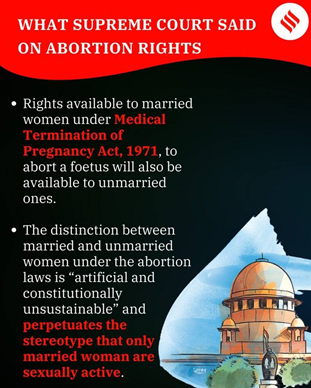

30th September 2022 (7 Topics)
Context
The Supreme Court in a significant judgment recently said it is unconstitutional to distinguish between married and unmarried women for allowing termination of pregnancy on certain exceptional grounds when the foetus is between 20-24 weeks.
About
- The right to abortion has proved contentious globally after the United States Supreme Court overturned in June its landmark decision in Roe v Wade that had legalised the procedure in the US.
- The Recent Case: The challenge to the provision was made in July by a 25-year-old unmarried woman who moved the court seeking an abortion after the Delhi High Court declined her plea. The woman’s case was that she wished to terminate her pregnancy as “her partner had refused to marry her at the last stage”.
- She also argued that the continuation of the pregnancy would involve a risk of grave and immense injury to her mental health. However, the law allowed such change in circumstances only for “marital” relationships.
- The Supreme Court, holding that the law had to be given a purposive interpretation, had allowed the petitioner to terminate her pregnancy in an interim order. However, the larger challenge to the law, which would benefit other women as well, was kept pending.
India’s law on abortion:
- Section 312 of the Indian Penal Code, 1860, criminalizes voluntarily “causing miscarriage” even when the miscarriage is with the pregnant woman’s consent, except when the miscarriage is caused to save the woman’s life.
- In 1971, The Medical Termination of Pregnancy Act (MTP Act)was introduced to “liberalize” access to abortion since the restrictive criminal provision was leading to women using unsafe and dangerous methods for termination of pregnancy.
|
Conservative Approach of the legislators: Parliamentary debates on the MTP Act reveal that legislators were concerned that a “liberal” abortion law would promote sexual promiscuity amongst women. Addressing this concern, the government, through its ministers, assured Parliament that “by far the greatest numbers of women who seek abortion are married. |
- The MTP Act allowed termination of pregnancy by a medical practitioner in two stages.
- For termination of pregnancy up to 12 weeks from conception, the opinion of one doctor was required.
- For pregnancies between 12 and 20 weeks old, the opinion of two doctors was required.
- Later on, due to the expansion of the access to safe and legal abortion services on humanitarian and social grounds to ensure universal access to comprehensive care, certain amendments were introduced.
- In 2021, Parliament amended the law and allowed for termination under the opinion of one doctor for pregnancies up to 20 weeks. For pregnancies between 20 and 24 weeks, the amended law requires the opinion of two doctors.
The Supreme Court’s interpretations:
- SC framed the interpretation of Rule 3B of the Medical Termination of Pregnancy Rules, 2003, as per which only some categories of women are allowed to seek termination of pregnancy between 20-24 weeks under certain extraordinary circumstances.
- For pregnancies between 20-24 weeks, Section 3B of the Rules under the MTP Act lists seven categories of women:
-
- survivors of sexual assault or rape or incest;
- minors;
- change of marital status during the on-going pregnancy (widowhood and divorce);
- women with physical disabilities (major disability as per criteria laid down under the Rights of Persons with Disabilities Act, 2016);
- mentally ill women including mental retardation;
- the foetal malformation that has substantial risk of being incompatible with life or if the child is born it may suffer from such physical or mental abnormalities to be seriously handicapped; and
- women with pregnancy in humanitarian settings or disaster or emergency situations as may be declared by the Government.”
- The court stated that the whole Rule 3B(c) cannot be read in isolation but has to be read together with other sub-clauses under 3B.
- When other sub-clauses do not distinguish between married or unmarried women, for example survivors of sexual assault, minors, etc., only 3B(c) cannot exclude unmarried women, the court held.

Effects of the Judgement:
- The court’s “purposive interpretation” states that the common thread in Rule 3B is “a change in a woman’s material circumstance”.
- While the ruling recognises the right of unmarried women, it leaves the enforcement of the right to be decided on a case-to-case basis.
- It is not possible for either the legislature or the courts to list each of the potential events which would qualify as a change of material circumstances.
- Suffice it to say that each case must be tested against this standard with due regard to the unique facts and circumstances that a pregnant woman finds herself in.
More Articles


